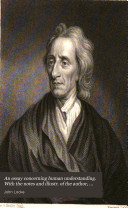Molyneux's problem
I shall here insert a problem of that very ingenious and studious promoter of real knowledge, the learned and worthy Mr. Molyneux, which he was pleased to send me in a letter some months since; and it is this:- "Suppose a man born blind, and now adult, and taught by his touch to distinguish between a cube and a sphere of the same metal, and nighly of the same bigness, so as to tell, when he felt one and the other, which is the cube, which the sphere. Suppose then the cube and sphere placed on a table, and the blind man be made to see: quaere, whether by his sight, before he touched them, he could now distinguish and tell which is the globe, which the cube?" To which the acute and judicious proposer answers, "Not. For, though he has obtained the experience of how a globe, how a cube affects his touch, yet he has not yet obtained the experience, that what affects his touch so or so, must affect his sight so or so; or that a protuberant angle in the cube, that pressed his hand unequally, shall appear to his eye as it does in the cube."- I agree with this thinking gentleman, whom I am proud to call my friend, in his answer to this problem; and am of opinion that the blind man, at first sight, would not be able with certainty to say which was the globe, which the cube, whilst he only saw them; though he could unerringly name them by his touch, and certainly distinguish them by the difference of their figures felt. This I have set down, and leave with my reader, as an occasion for him to consider how much he may be beholden to experience, improvement, and acquired notions, where he thinks he had not the least use of, or help from them. And the rather, because this observing gentleman further adds, that "having, upon the occasion of my book, proposed this to divers very ingenious men, he hardly ever met with one that at first gave the answer to it which he thinks true, till by hearing his reasons they were convinced.
Notes:
A blind person, familiar with a cube and sphere by touch, is made to see. Without touching the objects, would they be able to distinguish them by sight?
Folksonomies: empiricism senses experience thought experiment
Taxonomies:
/technology and computing/computer certification (0.451127)
/home and garden/home improvement and repair (0.243081)
/technology and computing/consumer electronics/ebook reader (0.239673)
Keywords:
cube (0.998725 (negative:-0.313356)), worthy Mr. Molyneux (0.866014 (neutral:0.000000)), judicious proposer answers (0.848451 (positive:0.266615)), blind man (0.824325 (negative:-0.452450)), touch (0.711703 (negative:-0.278748)), blind person (0.676457 (negative:-0.606837)), sight (0.671513 (negative:-0.223269)), studious promoter (0.650571 (neutral:0.000000)), real knowledge (0.644595 (neutral:0.000000)), protuberant angle (0.626272 (neutral:0.000000)), sphere (0.593446 (negative:-0.278748)), problem (0.571745 (negative:-0.606837)), globe (0.560331 (neutral:0.000000)), gentleman (0.509362 (positive:0.311373)), occasion (0.498420 (positive:0.272975)), bigness (0.469943 (neutral:0.000000)), experience (0.468299 (neutral:0.000000)), certainty (0.455378 (neutral:0.000000)), objects (0.454363 (neutral:0.000000)), letter (0.450363 (neutral:0.000000)), adult (0.450108 (neutral:0.000000)), metal (0.449878 (neutral:0.000000)), notions (0.449632 (positive:0.315025)), table (0.448736 (negative:-0.347964)), quaere (0.448597 (neutral:0.000000)), acute (0.447354 (positive:0.266615)), hand (0.446134 (neutral:0.000000)), difference (0.446061 (neutral:0.000000)), eye (0.446048 (neutral:0.000000)), cube. (0.445974 (neutral:0.000000))
Entities:
Mr. Molyneux:Person (0.927373 (neutral:0.000000))
Concepts:
IPod Touch (0.911075): website | dbpedia | freebase
The Blind (0.644805): dbpedia | freebase | yago
Somatosensory system (0.642780): dbpedia | freebase
Affect (0.641914): dbpedia
Proposal (0.641407): dbpedia

Triples
 Do the Blind See?
Do the Blind See?
Molyneux's problem > Contrast > Sensations are Related in the BrainAre the visual parts of the brain brought into play when a blind person feels their way around the world?




